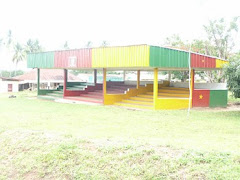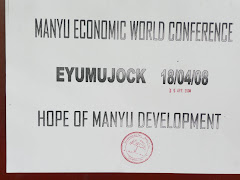
The event
was scheduled for Saturday March 2, and billed as a fundraiser dinner but
turned out to be much more. The folks of Mamfe Central Washington came out
elegantly and in style to support a cause and enjoy exquisite fine
cuisine. Within the atmosphere, there was sense of optimism, pride and
hope for a better and rejuvenated Mamfe metropolis. This hope rest on prospects
of a vibrant economy, and the rebirth of Mamfe as a commercial hub. We could
see this happening once the ongoing road projects are completed in the
division. But there is also a sense of hope that although small in numbers, the
Mamfe Central community has an opportunity to contribute in the development of
its division by investing in the education of the future generation.
Before we get into the details of how a small group could haul
close to $10,000 on a winter evening for development, let’s look at how it all
unfolded. The Tambe’s – Mirabel and Manfred are an exemplary young and
hardworking couple in the community. You will never notice their presence until
they fling open the doors of their quiet and beautiful residence as they did on
this special night. Indeed, everyone, I mean everyone was invited to
Bristol wood terrace and if you missed the event, then regrettably you will
have to wait until history repeats itself and in life sometimes, those
occasions are rare. Once ushered into the basement where the action was
set to take place, you could smell the aroma of the cuisine at the stairs. The
white clothe table settings was reminiscent of a fine French restaurant. Indeed,
it was nothing short of Mamfe Central elegance – after all, the Mamfe Central
folks always remind us they hold the keys to good life in Mamfe.
Chief Samuel Etchu took charge of the musical controls. He
ushered us back to the good old days when he played the role of DJ and
entertained the community at large. It seemed, the Chief never lost that mida’s
touch as he supplied the vibes with a repertoire of selections of Manyu genres.
It is the more reason, we have come to know the Mamfe Central Chief as one who
carries a trademark of versatality and he sure did not disappoint.
Our host Chef Mirabel Tambe kept us wining and dining all night
long. There was plenty to eat and drink – even if you had to do three rounds
like I did. How could a Manyu event be deprived of Eru and plenty of
particulars, Koki and all the fine dishes only bachelors could dream of.
Many thanks to the supporting cast of Mamfe Central ladies and Mirabel’s, mom –
the one and only Dr./Mrs. Mary Tabot who prepared special take home dinner platters
for high donors. Did I forget to mention the man of the house, the ever smiling
and gentle Mr. Manfred Tambe –better half of Mirabel. Manfred was the maitre D,
stocking the dinner tables with fine wines, whisky and beer. When I left the
event at 1 am, the tables still had bottles standing; and I kept thinking maybe
the cold winter now makes us drink less.
It finally came down to business and the raison etre for the
event. Sesekou Dr. David Tambe (MEDWC USA Coordinator) flew in from Dallas
Texas and delivered a pointed presentation of the goals of the 2013 Mamfe
Central conference and MEDWC accomplishment since 2003. The audience was
engaged and took part in a Q/A to know more especially with the prevailing
standards of education in the division. Perhaps the most touching and
heart-rendering part of the program was watching images of little boys and
girls standing in queue at the 2008 Eyumojock conference to receive
scholarships. You could sense the joy and relief in these young people -
knowing the larger community other than their parents cared and was there to
support them to achieve their dreams.
As the night wore on, the audience dug deep into their wallets
and contributed without reservations. The haul for the night was close to
$10,000 with a late announcement from MECA Dallas of a contribution of $1000.
With enthusiasm and renewed interest, the Mamfe Central conference will reach
its goal of $15,000 before the conference doors open in Mamfe on March 22,
2013.
Given the resounding success of the dinner fundraiser, we
learned one thing from the Mamfe Central community. Although development can
sometimes be a game of numbers, what counts is commitment and the belief that
every one of us can make a difference if we try. The Mamfe Central Washington
community did more that try on a solemn quiet evening; they hauled $10,000 for
development with the support of their patron Attorney William Tabot and Ms.
Mercy Mokwonye (Fundraiser chief lady). As we left, Mirabel and Manfred were
ever so present giving hugs, parting good bye and thanking us for coming. In
the end, we thank our host the Tambe’s for the hospitality and opening their
doors to Manyu with joyful abundance.
































